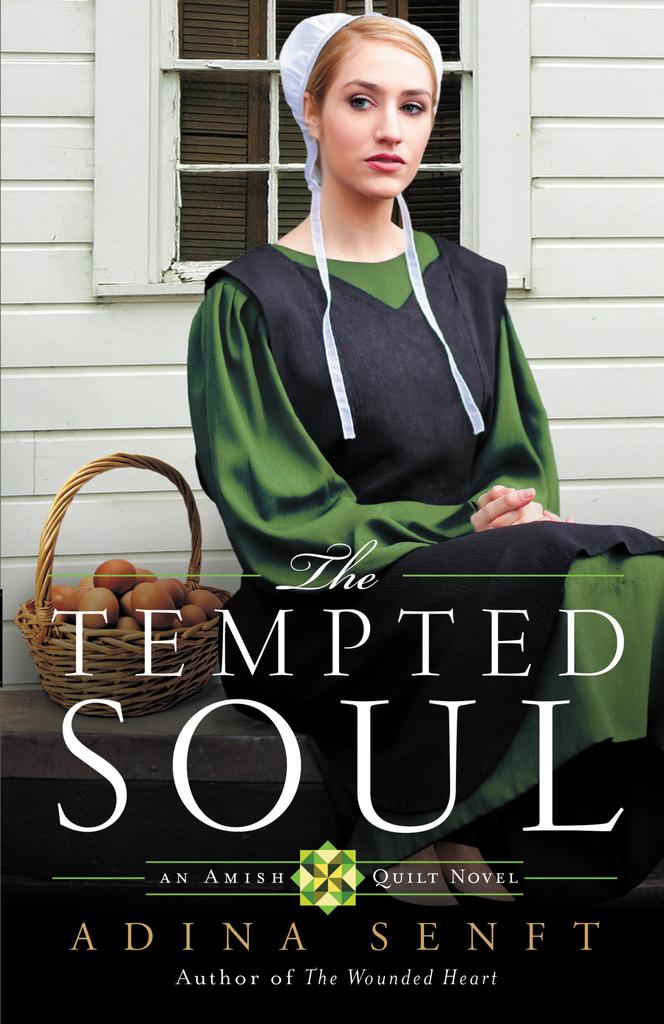The Tempted Soul
Authors: Adina Senft




In accordance with the U.S. Copyright Act of 1976, the scanning, uploading, and electronic sharing of any part of this book without the permission of the publisher constitute unlawful piracy and theft of the author’s intellectual property. If you would like to use material from the book (other than for review purposes), prior written permission must be obtained by contacting the publisher at [email protected]. Thank you for your support of the author’s rights.
For my sister Lori
Thanks to Jeff for coming up with ideas that save the day, and to Jackie Yau for constant encouragement and help with getting the facts about IVF right. Thanks also go to Dr. Ronda Wells; neonatal nurse Melissa Maygrove; Dee Stoddard, BSN, RN; and Love Inspired Historicals author Laurie Kingerey for guiding me through Lydia’s hospital stay; and to Dr. Manley Clodfelter, with apologies for elevating his heart rate with an ER doc’s worst nightmare.
Grateful thanks to Jody Waldrup and the FaithWords art department, whose design of my books and covers is so close to what lives in my head that they constantly amaze me. Lastly, thanks to my editor, Christina Boys, and my agent, Jennifer Jackson, for helping me stitch this series together.
There hath no temptation taken you but such as is common to man: but God [is] faithful, who will not suffer you to be tempted above that ye are able; but will with the temptation also make a way to escape, that ye may be able to bear [it].
—I Cor. 10:13, KJV
C
hickens and babies had a number of things in common. They needed food and protection. They made their needs known with a variety of sounds. And they loved to be loved.
Carrie Miller buttoned her jacket and sat on the top step of the porch, and within a few moments, Dinah, one of her six Buff Orpington hens, had climbed into her lap and settled there with a contented sigh. If ever a woman was rich in love, Carrie was that woman. She had a husband who loved her and wasn’t afraid to show it. She had a home to care for, and friends she could count on no matter what. And now, three quarters of her flock had seen her sitting, so they hopped up the wooden steps and clustered around her, some lying on their sides to soak up the early October sun, some preening their feathers, and some circling and waiting for Dinah to leave her lap so they could have their turn.
Her best friends, Amelia Fischer and Emma Stolzfus, would laugh and ask if the chickens also had their own chairs at the kitchen table with her and Melvin. Or worse, make pointed comments about the intended use of barnyard animals, which God had said were for food. But Carrie just smiled and let them have their fun.
Most days, she enjoyed the chickens as comforting, affectionate companions who would never see the inside of a soup pot if Carrie had anything to say about it.
But on some days…
Days like today, when her monthly had made its scheduled appearance.
On days like these, she teetered on the edge of grief and despair, knowing she must not fall in, and yet finding it impossible not to. On days like today, even the chickens couldn’t help. Her left arm tightened around Dinah’s fluffy golden body, making the shape of a cradle that in almost eleven years of marriage, had never been filled with what she wanted most—a child of her own.
In their district in Whinburg Township, Pennsylvania—in every district, every Amish community, no matter where you were in the country—the
Kinner
were celebrated as a blessing from God. Some women had families of eight or ten, a miracle Carrie could hardly comprehend. In Whinburg, five or six was the average number, and if you weren’t expecting by the end of your first year of marriage, why, the married women would start asking gentle questions.
Some were more sensitive than others when it became obvious their humor and concern caused her pain. Some, like her mother-in-law, Aleta Miller, saw it as their duty to act as a kind of coach, blissfully unaware that their remarks and hints and general helpfulness on the subject were enough to make a person run for the chicken coop, where she could find acceptance and blessed, blessed silence.
And some, like Amelia and Emma, had stopped asking at all.
This was only one of the reasons why Tuesday afternoons meant everything to her. The three of them met every week, in the two hours before Amelia’s two boys got home from school, ostensibly to work on a quilt, but really to refresh themselves at the wells of one another’s friendship. There were some weeks, when Melvin’s work on the farm had not produced as well as it might have, that their time together literally saved Carrie from physical hunger. Certainly it saved her from a kind of hunger of the heart—the kind that a husband, no matter how beloved and caring—might not even know existed.
And today was Tuesday.
Emma had an eye for the little gifts that the
gut Gott
sprinkled upon His children from the largesse of His hands. For Carrie, Tuesdays were among those gifts.
“All right, you,” she said to Dinah, sliding her hand under the bird’s feet and gently setting her on the warm planks of the porch, “it is time for both of us to give up our idle ways. I’ll be back in time to put you in the coop, and the pork roast will be cooked and ready for Melvin’s supper.”
Dinah stalked away to inspect the flowerbeds, the rest of the flock scrambling to their feet to follow her, just in case they missed out on something.
The quilting frolic was to be at the
Daadi Haus,
where Emma lived with her elderly mother, Lena. The Stolzfus place being way over on the other side of the highway, it meant that either Carrie planned forty-five minutes’ walk or simply hitched up and drove. But today, as on most days, Melvin had the buggy to go to the industrial area on the fringes of Lancaster to talk to the businesses there about building shipping pallets. She could take the spring wagon, which was their only other vehicle, but decided against it. Walking was good for her, and she often observed more on foot than she might when she was watching traffic and keeping an eye out for hazards that might spook Jimsy, their gelding.
Besides, she knew a shortcut or two that Jimsy couldn’t manage, and that included a walk along the creek that ran through the settlement. It was a good place to watch birds and see the occasional fox or raccoon, and an equally good place to pick flowers and leaves to make things with.
By the time she let herself in through the back gate of the Stolzfus place, she had spotted out a loop of autumn-red Virginia creeper and some wild grape that would make the perfect base for an autumn harvest wreath. Her sister Susan’s birthday was coming up, and she knew just the place in her house where it would fit perfectly.
Emma waved from the back porch of the
Daadi Haus
. “You’re early! Amelia isn’t even here yet, and she’s only ten minutes over the field.”
“I didn’t want to rush the walk on such a pretty day, so I left a little sooner.” Carrie hugged Emma, then held her at arm’s length. “You look so happy,
Liewi
. Wedding plans must agree with you.”
If you wanted to transform a plain, workaday woman into a beautiful one, just apply happiness. It worked so much better than face paint.
Emma’s smile flashed and her green eyes sparkled. “They do indeed. Every job I finish, every jar of tomatoes I can, every quart of beans I put up brings me closer to November first. I’m canning my way through the calendar, vegetable by vegetable. By the time we get to potatoes, I’ll be married.”
Carrie laughed. “That’s a good way to look at all this work.” In the kitchen, she could see that Emma had only just stopped for the day. Rows of beans and carrots in glass jars sat cooling on towels laid out on the counter, and clean ones filled the drain rack for tomorrow. “I don’t know about you, but my garden has been huge this year. I suppose it was because we had such a wet spring.”
“God has been very good.” Emma put the kettle on the stove, but didn’t light the gas burner. It was better to have tea and a snack after you got your work done, not before. Otherwise, you might never get to it. “Lots of vegetables means we can begin married life with a full pantry, and leave plenty for Mamm to take with her when she goes to my sister Katherine’s to live. And with your big garden, you will have enough to feed Melvin until April at least.”
“Longer if he travels to the auctions to talk to people about buying pallets. I’ll be on my own for those weeks.”
Emma’s gaze settled on her, and Carrie resisted the urge to look away. A gaze like that commanded honesty—and of course they were honest with each other. You couldn’t very well offer counsel to a friend if she hid her true feelings and thoughts from you. But some things lay so close to the heart that it was all too easy for words to bruise them.
“Does he have to go?” Emma asked quietly.
“It…it’s what he’s good at.” Melvin had worked so hard at being a farmer, which he was not good at. He’d sunk money they didn’t have into the soil, where seed seemed to rot and plows churned up more rocks than crops. In a good year, when something actually grew, then the market would be down and the price of corn or soybeans would be poor, and they would face an oncoming winter with a feeling akin to panic.
God had always provided, but in those moments before He did, Carrie had gazed into her empty cupboards and resigned herself to another supper of eggs on toast instead of the creamed potatoes, pork chops and gravy, and buttered beans she knew other women in the settlement were preparing for their families.
Thank heaven for the chickens. They had sustained her and Melvin through some thin times. And not once had he forced her to put one of them on the table.
He was a good man. Things were looking up for them, now that he had leased his fields out, bought into the pallet shop, and found his calling as one who could bring in business simply by talking to people. Carrie had even put on a little weight, and was now pinning her belt apron closer to the center of her back, as was normal. She needed to eat good things and get her strength up, and then maybe a tiny seed would sprout in a more fertile environment.
She must take a page from Emma’s book and look at all the gifts God was providing. Then maybe she could get her mind off those that He was not.
Not yet, anyway.
A few minutes later, they heard Amelia’s footsteps on the porch. “Hallo, where is everyone?”
“We’re in the kitchen,” Emma called.
Carrie met her on the threshold in a flurry of hugs and sorting of carry bags. “Where is Lena today?” she asked Emma as they trooped into the front room, the largest in the house. It gleamed with polish, and in the middle was the dining room table, all its leaves inserted, waiting for the quilt.
“Katherine came up yesterday to get some of her things, and Mamm decided to go along for a visit. She’ll be back tomorrow.”
“It seems strange to be here without her,” Amelia said. “Take a corner of this, will you?”
They shook out the quilt and spread it over the tabletop, its three layers pinned together, the white lines looking like ghosts of the patterns they would quilt on it over the next several weeks.
“It is strange,” Emma said, smoothing the fabric with something almost like affection. It was, after all, to be her wedding quilt, made by the three of them over the last year. Their confidences, tears, and laughter had all been stitched into it, square by square. The tiny stitches of their quilting patterns would secure it all, like a protective blanket of friendship that Emma would take into her new life.
Carrie wondered what more the quilt could hold. Until the moment they finished stitching down the binding, she supposed, it would always be able to take just a little more.
But Emma was still speaking. Carrie snapped her wandering thoughts back into order.
“I haven’t stayed here alone much since Mamm and I moved in here. I used to chafe at my lack of freedom, but now I see what a gift it has been, being with her all this time.” She straightened, her generous mouth a little rueful. “For her seventy-ninth birthday, she’ll be down at Katherine’s. I wonder if it will seem strange to her, not to celebrate a birthday on the home place. I know it will seem awfully strange to me.”
Carrie found her marking chalk and located the place on the twined-feathers border where she’d left off the Tuesday before. “Who will be moving in here after November?” Since Emma’s oldest sister, Karen, and her husband owned the farm now, the tenants of the
Daadi Haus
were their decision.
“I haven’t been officially informed,” said Emma dryly, “but I have a feeling that John’s folks will be moving in. His younger brothers are planning to sell that big place they’ve been farming on the other side of Intercourse, and move to the new settlement in upstate New York. If they do that, the old folks will need somewhere to live.”
“Does Karen get along with her in-laws?” Amelia asked almost absently, focused on the pattern she was marking.
Emma thought for a moment. “Well, if you take Carrie’s mother-in-law, mix in two cups of your mother, sprinkle with a bit of Mamm—not too much, mind—and a few teaspoons of Mary Lapp, and then whip it all up with some cider vinegar, you’d have an approximation of Ada Stolzfus.”
Amelia snorted through her nose, and Carrie let out a whoop of laughter that surprised even her. “Emma!”
“What? It’s true.” Emma smiled the kind of smile that sees the end of great tribulation and the blessings on the other side. “After all these years of ruling the roost, my sister is going to meet her match—right next door.”
“God’s plans for us are truly
wunderbaar
,” Amelia said, her face not only straight but positively beatific.
“Amen,” Carrie said on an equally solemn note, and got back to work before the look on Emma’s face made them all burst into unseemly laughter. Only they knew what a trial Karen was to Emma, and how everyone on the farm had chafed under the reins of her control.
When she reached the end of one of the long sides of the quilt, Carrie had to do a little adjusting of the width of the feathers to make them meet the corner pattern properly. “If you had told me in third grade that I’d be using arithmetic every time I picked up a quilting needle, I might have paid more attention.”
Emma nodded. “I was explaining to MaryAnn not too long ago that it’s vital to learn fractions, otherwise you’ll have a lot of
Druwwel
in the kitchen. Being Karen’s daughter, she has a very practical view of that kind of thing.”
“Nothing more practical than fractions,” Amelia said, eyeballing her own corner and clearly doing the same calculations in her head. “She’ll need them when she’s older and running her own home. Speaking of children getting older, I saw Lydia Zook riding in a courting buggy on Sunday evening. How can that child be sixteen already?”
Carrie nodded sadly. “I know what you mean. I worked as a
Maud
for poor Rachel when Lydia was born—which was only last week, wasn’t it?”
“Listen to us,” Emma said. “We sound just like the old ladies we were determined never to be. And in case you were wondering, yes, time does go faster the less of it you have left.”
“I had never wondered that, but thank you for telling me,” Carrie said wryly. “How does anyone know how much they have left, anyway? That’s in God’s hands.”
“Look at Mamm,” Emma said. “She’s seventy-eight and doesn’t seem to mind how fast it goes, only that she gets as much accomplished in a day as she can.”
“And then you have someone like poor Lavina Weaver, whose time was cut off in her twenties.”
A little silence fell. It hadn’t been so long ago that the community had buried Grant Weaver’s runaway first wife, who had chosen an
Englisch
man over her husband and family. Carrie risked a glance at Emma, who merely nodded in agreement and whisked chalk along the guides without so much as a hitch in her pace.
